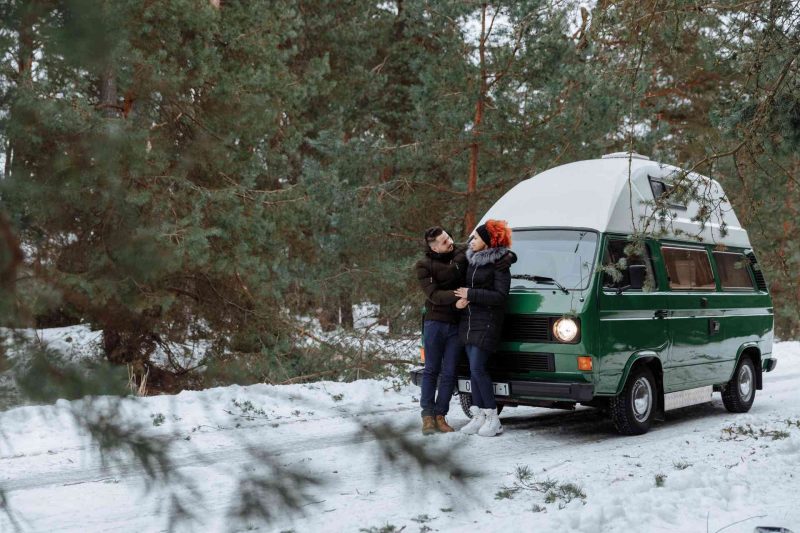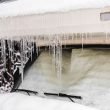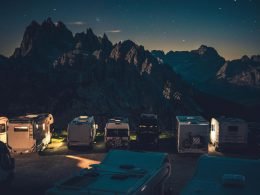Just because the temperatures drop doesn’t mean your RV adventures have to end. There are plenty of RVers who use their rigs year-round. While many pack up and head south to enjoy warmer weather during the winter, some endure all that Old Man Winter has to offer in the northern states. But is it safe to RV in the snow?
Today, we’re looking at whether you and your loved ones can safely enjoy your rig and make some memories while RVing in the snow. Grab your mittens and snow boots, and let’s get started!

Is It Safe to RV in the Snow?
RVing in the snow is generally safe. However, it’s essential to consider the amount of snow.
Driving a standard vehicle on snow can be challenging, but driving a motorhome or towing a large trailer in snow can be downright scary. For maximum safety, your best bet is to get you and your RV to your destination before the snow arrives.
You’ll want to have your RV set up in time to prepare it for the snow, especially if it will include extreme winter temperatures. Many find that installing RV skirting and using a heated hose helps reduce many potential damages from winter RVing.

Another vital thing to remember is how much snow is on your RV. Snow can be extremely heavy and typically weighs anywhere from 4 to 6 pounds per cubic foot.
However, extremely wet snow conditions can be substantially heavier. This could result in several hundred pounds of weight added to your rig, which can cause severe damage.
How Cold Is Too Cold for an RV?
While winter camping can be a unique experience, not every RV can handle it. Some are better than others at handling the cold.
While many can easily handle temperatures at or slightly below freezing, some of the best-built rigs can handle single-digit temperatures. Most RVs struggle once the temperatures hit the low 20s or upper teens.
However, no matter how much you spend on a rig, RVing during frigid temperatures can be challenging for you and your RV. You’ll likely use a lot of power and propane while trying to keep warm.
Many systems in an RV won’t like the cold weather and may struggle to function to their full capacity. Plumbing systems can quickly freeze, especially the further temperatures dip below freezing.
HOT TIP
Find out if your RV can survive freezing temps ❄️
Will RV Pipes Freeze in One Night?
If your RV sits in freezing temperatures overnight, its pipes and lines can freeze. However, it greatly depends on the quality of the insulation and construction from the manufacturer.
As we mentioned earlier, some RVs can handle freezing temperatures well into the upper teens before they start to experience issues. On the other hand, some cheaper or less-capable RVs will begin to experience frozen pipes during mid to upper-20s temperatures.
Can RV Holding Tanks Freeze?
Some RVers experience frozen holding tanks during extreme winter temperatures. But, the more water there is in your tanks, the harder it will be for them to freeze.
Many modern units include heaters that act as heated blankets for the tanks. With the flip of a switch, these blankets can keep the temperatures of the holding tanks above freezing.
If you’re RVing and there are freezing temperatures in the forest, it’s a good idea to fill your freshwater tank and empty your black and gray tanks. Having as much room as possible for water to expand inside your black and gray tanks can prevent damage should they freeze.
Tips for RVing in the Snow
You can do several things to stay safe while RVing in the snow. Doing these items will help protect not only your rig but also you and your loved ones while you’re RVing.
Reduce Your Speed
Driving or towing an RV can be extremely challenging under ideal circumstances. However, it can be incredibly challenging during extreme winter weather. If you’re not careful, you can lose traction and control of your vehicle.

Speeding while RVing is never a good idea, especially if there’s snow or ice on the roads. To stay safe and arrive at your destination, you must reduce your speed when RVing in the snow. If not, you could be in a potentially deadly and dangerous situation.
Buy a Heated Water Hose or Fill Freshwater Tanks
Many new RVers need to remember how freezing temperatures affect their water hose. Temperatures don’t have to drop below freezing for too long for the minimal amount of water in a hose will freeze. While a heated water hose can be expensive, the protection it provides your RV’s plumbing system is worth every penny.
If you plan to regularly RV in winter weather, a heated water hose is a must-have item. Water freezing in your plumbing system can cause cracks in the lines and damage fittings.
If they do, you’ll discover a massive issue once the temperatures warm up and things start to thaw. Some RVers have had the unfortunate experience of finding water pouring out from under their rigs.
Have Plenty of Propane
Propane is the most effective and efficient source of heat in an RV. However, the colder it gets, the more you will use it. Temperatures dipping into single digits could result in burning through a 20-pound or 30-pound propane tank in a day or two.
Those sitting stationary throughout the winter will purchase kits to connect a 100-pound tank or larger. While this doesn’t prevent them from using a ton of propane, it drastically reduces the chances of waking up in the middle of the night and discovering you’ve run out of it.
If you have any specific questions, call your local residential propane provider. They’ll likely be able to help and may rent you a larger propane tank to make it easier for you and your RV to stay safe and comfortable during winter.
Beef Up Insulation
RVs are notorious for lacking insulation. What little insulation manufacturers put into their rigs is typically mediocre at best.
As a result, drafts can allow cold air from outside your rig to come inside your rig. This may require an owner to add insulation in areas where the manufacturer didn’t.
In addition, some RVers use insulation boards around the base of their rigs. The term for this is “skirting.”
No matter what material you use, the goal is to prevent the cold air from getting under your rig and potentially causing damage or dropping the temperature inside your rig.
Control Humidity
While propane may be the best option for heating your rig, it can cause some issues. When burning, propane creates moisture. This moisture gets released into the air as the warm air blows into your rig. The moisture lands on the various surfaces throughout your camper and, over time, creates a serious issue.
Mold can begin growing if moisture sits on surfaces for weeks or months. Some of the most common places RVers find mold is in clothes closets and under mattresses. However, mold will grow anywhere with high moisture and minimal air circulation.
Using dehumidifiers throughout your rig is the best way to remove moisture from the air. For these to be effective, you’ll need to empty them regularly.
Some RVers use one large unit, while others use multiple smaller units throughout their rig. Which you choose is totally up to you and your situation.
Enjoy Your Winter Wonderland RV Adventures
While many owners rush to prepare their RV when they see freezing temperatures in the forecast, that’s not always the case. A fresh blanket of snow can turn a landscape into a winter wonderland. This can transform an area or location you’ve visited dozens of times into an entirely new experience.
While colder temperatures and snow may make things slightly more difficult, you can enjoy the quietness of an empty campground and a trail with no noisy hikers. If you prepare yourself and your RV, it can be an enjoyable and memorable experience.
If You Want the Latest Travel News, Join Our Mailing List
Don’t rely on biased RV industry news sources to keep you informed. Stick with Nomadic News. We publish articles and breaking stories that matter to you every weekday.










